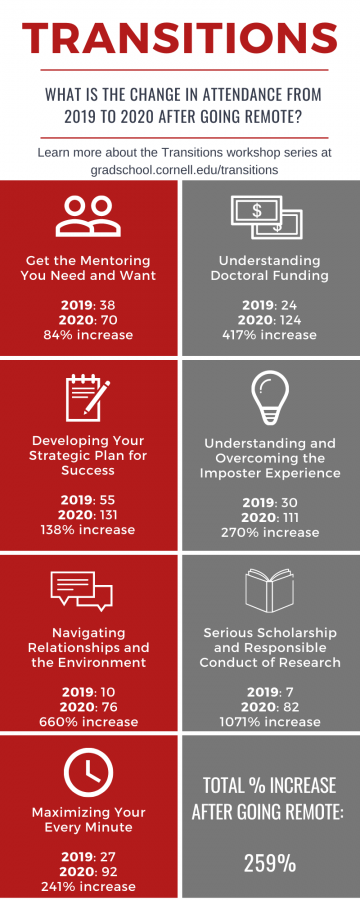Attendance Soars for 2020 Online Transitions Workshops
By Katya Hrichak
 Record numbers of students attended this August’s online Transitions workshops. Unlike years past where physical space limited attendance to about 60, Cornell’s move to remote professional development allowed greater numbers of participants to learn about graduate student life at Cornell, with some sessions seeing upwards of 100 participants.
Record numbers of students attended this August’s online Transitions workshops. Unlike years past where physical space limited attendance to about 60, Cornell’s move to remote professional development allowed greater numbers of participants to learn about graduate student life at Cornell, with some sessions seeing upwards of 100 participants.
“Transitions… Navigating Graduate School for First-Year Students”, a key component of Graduate School Orientation, went remote along with all other orientation activities. Through seven sessions, each offered twice, incoming students learn skills for a successful transition to graduate school with topics ranging from imposter syndrome to time management.
According to Jan Allen, associate dean of academic and student affairs and orientation committee chair, the move to remote resulted in unexpectedly high turnout.
“With the ability to access this content from anywhere, student engagement greatly increased from past years. Offering remote workshops led to a total attendance increase of over 250% with attendance for my responsible conduct of research session increasing over 1,000% from last year!”
Associate Dean for Administration Jason Kahabka sees online workshop attendance as a way for students to take charge of the current situation.
“In this year of unprecedented challenges, incoming students are seeking as much information as they can, and this was one way they could fill in the gaps,” he said.
Pleased with the turnout for his workshop on understanding doctoral funding, Kahabka believes that Zoom was integral to the program’s success. Engaging from a laptop or phone, from home or anywhere in the world, in real-time or with a recording, provided an answer to practical and logistical issues. Students did not have to spend time locating the building and traversing campus.
“The online platform is really helpful,” Senior Assistant Dean for Graduate Student Life Janna Lamey agreed. “We are getting more information out to students and they’re engaging with us and the material; hopefully they see us as a helpful and valuable resource to support their academic success.”
Having attended more than half of the sessions offered, genetics, genomics, and development first-year doctoral student Freddie Xu found that “the sessions had great information, especially for me.” As the only one in his family to enter a doctoral program, this semester “was really uncharted territory” in more ways than one.
Through the Transitions series, Xu learned that an advanced degree is a marathon rather than a sprint and pacing oneself prevents burnout. He considers the information foundational for his transition to graduate school and essential knowledge to advance through graduate school.
Organizers worried that placing students in breakout rooms at the end of each session would not adequately replicate the in-person opportunity to connect with other students, but Xu found the process effective. Through the breakout rooms, Xu was able to meet others in his cohort as well as students from outside his program.
“It has been difficult to meet our graduate school community in today’s Zoom climate,” he said, “This was a good starting point.”
Typically, Transitions is offered to first-year students at the beginning of their first semester; however, due to the online nature and success of this year’s programs, all graduate students were invited to participate in the repeated sessions in September. Unlike previous years, remote workshops were recorded and remain available for all graduate students to view throughout the semester on the Orientation Hub.
Now, Allen, Kahabka, and Lamey are considering adding more sessions and new topics to the workshop lineup so that more advanced students can similarly find support and information pertinent to where they are in their programs.
“The shift to remote has really changed the landscape because it is so easy to deliver these workshops,” said Kahabka. “The fact that it’s been well-received by students is a signal to us that we should keep doing it.”
Related:

